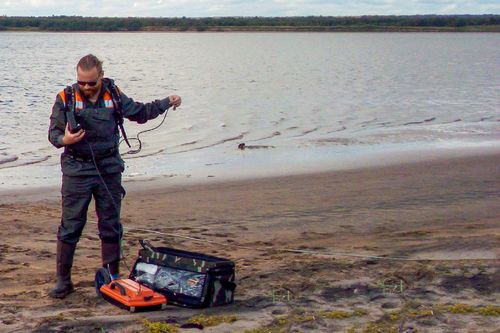News

August 2, 2022
Karelian scientists elaborating a new technique for surveying soils using ground-penetrating radar (GPR). The main method used in this sphere so far has been excavating soil pits manually, which is rather labor-intensive. With GPR sensing extensive areas can be analyzed relatively quickly. This facilitates a faster and more efficient soil mapping, recording of soil spatial variation, spotting of vulnerable or contaminated soil sites. It can have practical applications in precision agriculture and environmental monitoring.

July 28, 2022
Karelian biologist Viktor Mironov carried out a novel study on the daily effects of solar activity on plant growth. Previously, this phenomenon was usually studied on a yearly scale. The new detailed approach and personally done measurements of increment in over 160 000 moss shoots have helped the scientist discover previously unknown effects of solar activity.

July 26, 2022
State Report on the Environment in the Republic of Karelia in 2021 was published. It contains data on characteristics of the climate, air, land, water, forest, and biological resources and information about the economic and socio-demographic situation in the region.

July 19, 2022
Specialists from the Forest Research Institute (FRI) KarRC RAS study how spruce advance regeneration adapts to an abrupt change in light conditions in gaps formed by thinning. To this end, researchers started a large-scope two-year experiment with 12 forest plots for monitoring trees in different settings. This integrated study will serve both for theoretical science – improving the understanding of tree adaptation mechanisms, and for applied tasks – its results will form the background for silvicultural operations meant to form high-productivity coniferous stands.

July 15, 2022
Karelian scientists are back from an integrated expedition to the Tersky Coast of the White Sea. Specialists in a number of disciplines spent a fortnight surveying difficult-to-access areas in the northern part of the Kola Peninsula.

July 14, 2022
Scientists spot a connection between glaucoma and elevated cholesterol. Research data show that the death of eye retinal cells affects light sensitivity, thereby disrupting circadian rhythms and, in effect, causing lipid metabolism problems. The probability of a rise in cholesterol was found to be elevated by a certain variant of the CLOCK gene. This information is important for elaboration of personified treatment of the disease.

July 8, 2022
Karelian scientists are studying the effect of 24h light exposure on plants. The results can be applied to enhance crop productivity in agriculture. In June, staff of the Institute of Biology KarRC RAS went on an expedition to Russia’s northernmost botanical garden in Kirovsk to compare the response to midnight sun in native plants and in plants introduced from regions that have no periods with 24h light.

July 7, 2022
The international mathematical conference MOTOR 2022, which took place in Karelia on July 2–6, gathered specialists from nine countries. Mathematicians from cities of Russia and China participated in person and their colleagues from other countries joined online. Experts discussed the questions and problems of mathematical optimization, which has practical applications in various spheres of our life.



